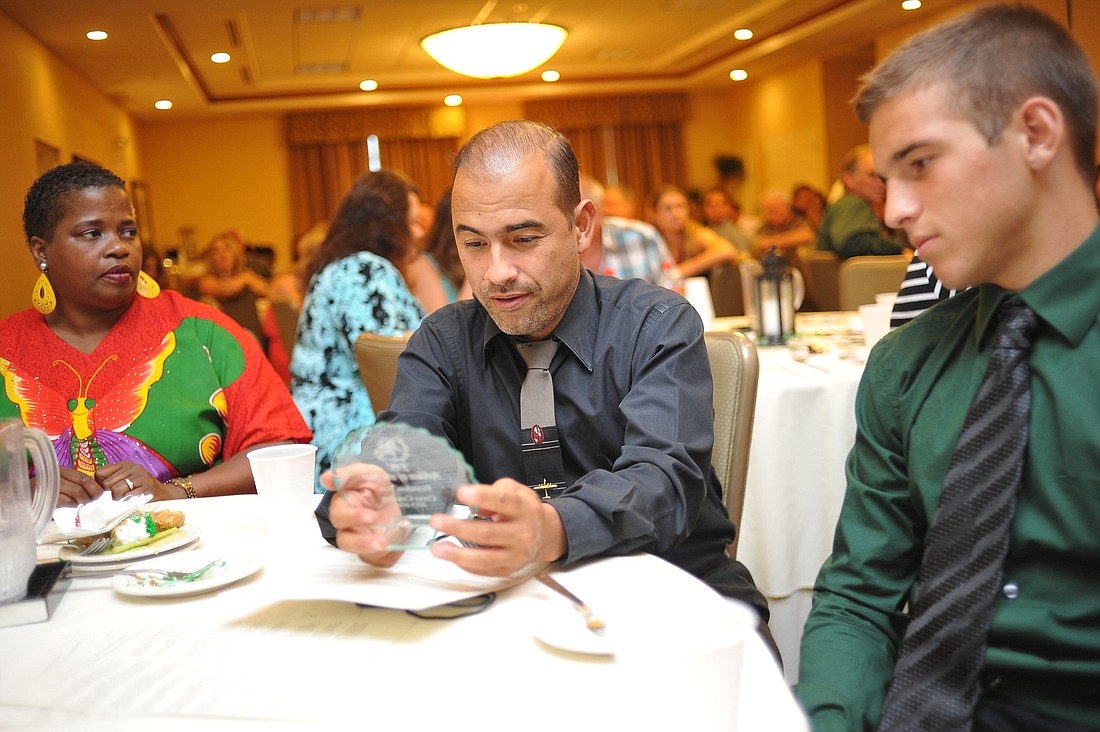- April 18, 2024
-
-
Loading

Loading

Running through a flash sandstorm in the shadow of Egypt’s pyramids didn’t trip up Brandon Roa. Digesting chunks of a reading assignment or writing an essay proved to be the bona fide roadblocks.
Roa, who Thursday was named Flagler Palm Coast’s Cross Country Athlete of the Year, suffers from dyslexia. The language processing disorder hinders reading, writing, spelling and sometimes even speaking, according to the National Center for Learning Disabilities website.
“Writing was a big one, and reading affected me in the English area,” Roa said. “When I’d read, I’d mix up my letters. My writing was terrible.”
He was diagnosed as a small child. Now a senior, Roa was named the Bulldogs captain and plans to study aeronautical engineering at Embry-Riddle next year.
No IEP for me
The situation came to a head when the Roas moved to Egypt during Brandon’s eighth-grade year. His father Alvaro worked with the nearby embassy and Brandon was set to attend Cairo American College. There was one problem — a brutal admissions test. Roa destroyed the math portion, but due to his dyslexia, his English scores didn’t quite make the cut. The disparity between the two benchmarks puzzled school administrators.
“When the teachers got the scores, they thought he was cheating,” Alvaro Roa recalls.
They tested him again, and after learning about the dyslexia, decided to accept Brandon anyway.
CAC gave him help — like an extra class period for tutoring — and the U.S. military provided some additional services. It took less than a year for Roa to decide he could make A’s without them.
“They’d give me handicaps, but it started getting to a point where I didn’t want any handicaps,” he said. “I wanted to try to hang out with the normal kids, and I started doing that. Now, I take AP classes.”
Run like an Egyptian
The Middle East doesn’t lend itself to the typical Cross Country cliché of gliding through a field, across a creek, into some woods, or along a swamp. Instead, Roa raced in Dubai, London, and in or around some of the oldest man-made structures in existence — Egypt’s pyramids.
Alvaro started running with Brandon and his older brother Sebastian (who attends Southern Miss) when the former was four.
“Since I was young, I’d hate running,” Brandon said of those early jaunts. “My dad would force me to run two miles with them,”
Dad agreed. “He used to hate it,” Alvaro joked.
Brandon doesn’t remember the exact moment that running became a release, a diversion as opposed to a chore. But Cairo’s serene, arid environs sure didn’t hurt.
“I guess it just crept up on me,” he said of his love for the sport. “In Egypt, we’d run in the desert, and it would just be calm, relaxing, and I’d feel free.”
‘The little things’
The kids call it “the grind,” FPC coach Dave Halliday says. It’s the day-in, day-out struggle of balancing maximum output as an athlete with a challenging courseload. And Brandon Roa relishes it.
“It doesn’t matter how much it hurts, he goes 100% in every practice, he goes 100% in every race, there’s no quit in him,” Halliday said.
The Roas moved to Palm Coast in 2013. He missed the fall cross country season, but globbed on to the track team. As a junior that year, he ran a four-minute, 53-second mile time. This season, he posted a 4:38 — good for a 15-second improvement.
In his first year of Cross Country stateside, he blazed to a best of 16:50 on the 5,000-meter run — a standard race length. His accomplishments were recognized with first-team all-Conference and (News-Journal) all-area honors.
“It’s been really nice,” Roa said of Palm Coast. “I like the air here. The classes are challenging, but I could work with it.”
Halliday cited Roa’s adherence to icing his muscles, stretching, and even getting enough sleep; those activities comprise the behind-the-scenes routine he calls "the little things." Roa’s measured approach extends to race day.
“That’s how he runs his races,” Halliday said. “They may not be real sexy or pretty or whatever, but he’s going to go out there and compete until the wheels fall off.”
A long time ago, in a country one hemisphere away, Roa recalls a middle school race in the desert where conditions deteriorated quickly.
“It was pretty interesting,” he said. “There was a race out there, and we were just going when a sandstorm randomly hit.'
Fearing that the reduced visibility would cause athletes to lose their way, or worse — get injured — organizers encouraged runners to call it quits.
But not Roa. Whenever someone tells him to give up, he still has a pronounced language processing disorder.
“They were like stopping some people, but the people who were ahead kept going. I kept on going,” he said.